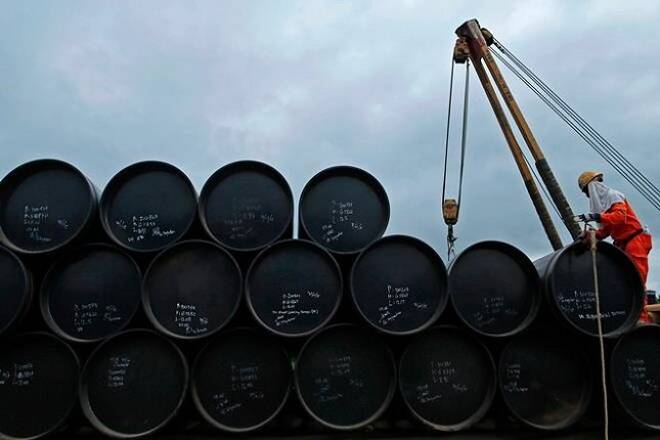Advertisement
Advertisement
Crude Oil Price Analysis for October 17, 2017
By:
Oil prices surged higher on Monday after Iraqi forces seized the oil fields around Kirkuk. There were conflicting reports as of Monday, but oil supplies
Oil prices surged higher on Monday after Iraqi forces seized the oil fields around Kirkuk. There were conflicting reports as of Monday, but oil supplies from the region may have been disrupted, although perhaps only temporarily. Reports say as much as 350,000 barrels a day of crude are now offline. The military maneuver by Iraqi forces comes as retaliation for the Kurdish independence vote. Iran closed border crossings, and in recent weeks Turkey threatened to cut off Kurdish oil exports.
Technicals
Crude oil prices moved higher but were unable to recapture resistance near a downward sloping trend line that comes in near 52.70. Support on crude oil prices is seen near the 10-day moving average at 50.62. A break of resistance is seen near the February highs near 55. Momentum has turned positive as the MACD (moving average convergence divergence) index generated a crossover buy signal. This occurs as the MACD index (the 12-day moving average minus the 26-day moving average) crosses above the MACD signal line (the 9-day moving average of the spread. The MACD histogram is printing in the black, with an upward sloping trajectory which points to higher prices.
Kurdish independence is a has Iraq on the brink of civil war. There were reports of a massive wave of civilians fleeing Kirkuk after the military incursion. Report from Reuters estimates the number of barrels that have come offline are 350,000 barrels a day of oil production from the Bai Hassan and Avana oil fields were temporarily shut down.
However, the Iraqi government insisted that it has restarted production under its control. The Kurdish Regional Government (KRG), said that it would not stop the flow of oil through its territory, where it is exported to Turkey, and ultimately, to the global market via a Mediterranean port on the Turkish Coast.
Even if oil flows from Iraq through its northern border are online and remain uninterrupted in the near-term, that does not mean that the oil market can breathe a sigh of relief. The struggle for Kirkuk, should continue to generate volatility.
Moreover, Kurdistan was exporting oil through its own pipeline, completed just a few years ago. In 2014, when ISIS rapidly seized large swathes of territory in Iraq’s north, Kurdish forces moved in and took Kirkuk as Iraqi forces fled ISIS’ advance. Since then, Kurdistan has exported Kirkuk’s oil through its pipeline.
OPEC Might not Need to Extend Production Agreement
OPEC and its partners may not need to extend the November 2016 crude oil production cut agreement beyond its March 2018 deadline if everyone fully complies with their quotas, Kuwait’s Oil Minister Essam al-Marzouk told media yesterday. Al-Marzouk noted that OPEC’s compliance rate had hit 116 percent, without adding, however, that this figure referred to August production specifically, while the September data from OPEC’s secondary sources revealed that compliance had fallen, with seven OPEC members pumping more in September than they did in.
The Kuwaiti minister, who leads the ministerial committee that monitors compliance with the deal, went on to add that the top priority for the cartel right now was to make all members stick to their quotas in order to render redundant another extension of the deal. He said OPEC will decide on whether to extend or not at its next meeting, which will take place on November 30 in Vienna.
Canada Investment Inflow Increase in August
Canada saw a C$9.8 billion investment inflow from abroad in August following the C$24.0 billion inflow in July. Bond purchases from abroad were C$8.2 billion in August after the C$23.8 billion inflow in July. The total purchase government bonds was C$6.1 billion in August, with C$4.3 billion going to Federal government bonds versus C$8.0 billion in July. Canadian investors boosted their holdings of foreign assets by C$12.0 billion, mostly in U.S. corporate debt instruments.
Empire State Rose to 8-Year High
The Empire State headline rose to an 8-year high of 30.2 that was also seen in September of 2014, from 24.4 in September, 25.2 in August and just 9.8 in July. The ISM-adjusted Empire State fell to a still-solid 54.9 from a 6-year high of 57.0 in September but a lower 54.2 in August and 53.3 in July. The producer sentiment surveys have risen sharply with the hurricane rebuild from already high levels, after showing little of the expected summer moderation from lofty peaks at the start of 2017. The rebuild-boost from Harvey, Irma, Nate and the California fires should extend into year-end.
About the Author
David Beckerauthor
David Becker focuses his attention on various consulting and portfolio management activities at Fortuity LLC, where he currently provides oversight for a multimillion-dollar portfolio consisting of commodities, debt, equities, real estate, and more.
Advertisement
